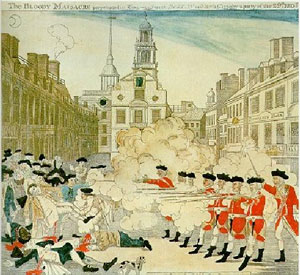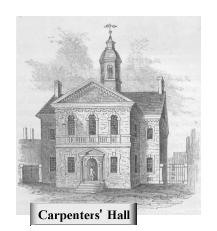news was generally disseminated in hand-written letters that were carried aboard ships or by couriers on horseback. Special committees of correspondence were formed by the colonial assemblies and various lesser arms of local government.The Committees of Correspondence were formed throughout the colonies as a means of coordinating action against Great Britain. Many were formed by the legislatures of the respective colonies, others by extra-governmental associations such as the Sons of Liberty in the various colonies. In any case, the members of these organizations represented the leading men of each colony. It took some time, and finally an act as dramatic as the Boston Port Bill, to coordinate the colonies in action against Great Britain
Stages Of The Revolution
Monday, September 19, 2011
Proclamation Of 1763
The end of the French and Indian War in 1763 was a cause for great celebration in the colonies, for it removed several ominous barriers and opened up a host of new opportunities for the colonists. The French had effectively hemmed in the British settlers and had, from the perspective of the settlers, played the "Indians" against them. The first thing on the minds of colonists was the great western frontier that had opened to them when the French ceded that contested territory to the British. The royal proclamation of 1763 did much to dampen that celebration. The proclamation, in effect, closed off the frontier to colonial expansion. The King and his council presented the proclamation as a measure to calm the fears of the Indians, who felt that the colonists would drive them from their lands as they expanded westward.
intolerable acts
The government spent immense sums of money on troops and equipment in an attempt to subjugate Massachusetts. British merchants had lost huge sums of money on looted, spoiled, and destroyed goods shipped to the colonies. The revenue generated by the Townshend duties, in 1770, amounted to less than £21,000. On March 5, 1770, Parliament repealed the duties, except for the one on tea. That same day, the Boston massacre set a course that would lead the Royal Governor to evacuate the occupying army from Boston, and would soon bring the revolution to armed rebellion throughout the colonies
townshed act
Taxes on glass, paint, oil, lead, paper, and tea were applied with the design of raising £40,000 a year for the administration of the colonies. The result was the resurrection of colonial hostilities created by the Stamp Act.

Troops from England and Nova Scotia marched in to occupy Boston Britain
tea act
The Tea Act, passed by Parliament on May 10, 1773, would launch the final spark to the revolutionary movement in Boston
Saturday, September 17, 2011
Boston Massacre (March 5 1770)

The Boston Massacre was a street fight that occurred on March 5, 1770, between a "patriot" mob, throwing snowballs, stones, and sticks, and a squad of British soldiers. Several colonists were killed and this led to a campaign by speech-writers to rouse the ire of the citizenry.
The presence of British troops in the city of Boston was increasingly unwelcome. The riot began when about 50 citizens attacked a British sentinel. A British officer, Captain Thomas Preston, called in additional soldiers, and these too were attacked, so the soldiers fired into the mob, killing 3 on the spot (a black sailor named Crispus Attucks, ropemaker Samuel Gray, and a mariner named James Caldwell), and wounding 8 others, two of whom died later (Samuel Maverick and Patrick Carr).
A town meeting was called demanding the removal of the British and the trial of Captain Preston and his men for murder. At the trial, John Adams and Josiah Quincy II defended the British, leading to their acquittal and release. Samuel Quincy and Robert Treat Paine were the attorneys for the prosecution. Later, two of the British soldiers were found guilty of manslaughter.
The Boston Massacre was a signal event leading to the Revolutionary War. It led directly to the Royal Governor evacuating the occupying army from the town of Boston. It would soon bring the revolution to armed rebellion throughout the colonies.
First Continental Congress Sept. 5 1774

The first Continental Congress met in Carpenter's Hall in Philadelphia, from September 5, to October 26, 1774. Carpenter's Hall was also the seat of the Pennsylvania Congress. All of the colonies except Georgia sent delegates. These were elected by the people, by the colonial legislatures, or by the committees of correspondence of the respective colonies. The colonies presented there were united in a determination to show a combined authority to Great Britain, but their aims were not uniform at all. Pennsylvania and New York sent delegates with firm instructions to seek a resolution with England. The other colonies voices were defensive of colonial rights, but pretty evenly divided between those who sought legislative parity, and the more radical members who were prepared for separation. Virginia's delegation was made up of a most even mix of these and not incidentally, presented the most eminent group of men in America. Colo. George Washington, Richard Henry Lee, Patrick Henry, Edmund Pendleton, Colo. Benjamin Harrison, Richard Bland, and at the head of them Peyton Randolph — who would immediately be elected president of the convention.
The objectives of the body were not entirely clear but, with such leadership as was found there, a core set of tasks was carried out. It was agreeable to all that the King and Parliament must be made to understand the grievances of the colonies and that the body must do everything possible to communicate the same to the population of America, and to the rest of the world.
The first few weeks were consumed in discussion and debate. The colonies had always, up to this time, acted as independent entities. There was much distrust to overcome. The first matter to be considered by all was A Plan of Union of Great Britain and the Colonies, offered by Joseph Galloway of Pennsylvania. The plan was considered very attractive to most of the members, as it proposed a popularly elected Grand Council which would represent the interests of the colonies as a whole, and would be a continental equivalent to the English Parliament. Poised against this would be a President General, appointed by the crown, to represent the authority of the king in America. Conflict in Boston overcame the effort at conciliation. The arrival of the Suffolk County (Boston) resolves just prior to the vote on the Plan of Union, caused it to be discarded by a narrow margin.
Subscribe to:
Posts (Atom)